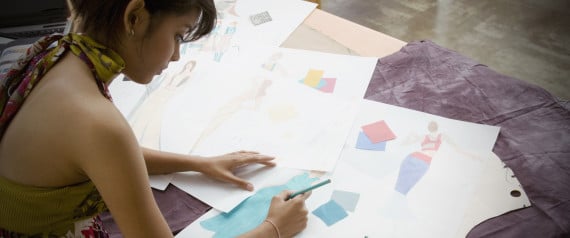Accelerating “Made in the USA:” How to Put the Brakes on Fast Fashion
It’s no secret that the 10.3 billion dollar fast fashion industry is the perpetrator of astronomical human rights and environmental disasters. Just utter the words “Rana Plaza,” “Cambodian sweatshop” or “Uzbek cotton” and you’ll see fingers pointing at fast fashion giants like Gap, Forever21 and H&M.
Landfills are overflowing with cheaply made garments we discard after one wear and it’s only a matter of time before the next human rights disaster makes the news. Depending on whom you’re talking to, though, there are two very different sides to the fashion conversation.
The story we hear is that the fashion industry is either dominating or that it’s completely broken.
But there’s another side of the story. It’s a side that doesn’t include fashion week and catwalks and Anna Wintour. Or falling buildings, rivers dyed red and children behind sewing machines.
It’s the underdog story that isn’t told as often, because it’s not glitzy or glamorous — and it’s not headline grabbing and sensational.
It’s the story of the made in the USA movement: the sewers, the farmers, the knitters, the suppliers — and the independent designers who refuse to sell out.
It’s the headline that may one day say: “Manufacturing in the U.S. is Here to Stay.”
The men and women behind this story know that an industry-wide change must start where any movement starts — from the ground up. Instead of feeding into the existing system — a fashion industry of waste, pollution and unethical labor practices — we can start to change the way clothing is made by replacing corrosive supply chains with transparent ones.
We can do this by supporting designers and entrepreneurs in creating businesses that are inherently good. By helping companies build supply chains with dignity from the beginning, we can begin to change the way fashion is created, valued and purchased.
It’s not easy manufacturing in the U.S. — factories and suppliers aren’t a simple Google search away. But with incubators and accelerator programs paving the way, we can show designers it is possible to manufacture in the United States and still make a profit.
These are some of the key players already taking the lead in supporting entrepreneurs who want to keep sustainability and ethics at the forefront of their business models.
The Carolina Textile District is a “strategic textile value chain of manufacturers connecting and collaborating” to support the once booming textile belt of America. With over 400 years of infrastructure, workers, experience and technology, The District is making it easier for designers to set up 100% U.S.-based supply chains.
-
ManufactureNY
With old factories sitting empty, and industrial spaces in the Garment District of NYC being rezoned as residential or commercial, founder & CEO Bob Bland started ManufactureNY to reawaken and rebuild America’s fashion industry. With connections to some of the best samplemakers, patternmakers and manufacturers in the industry, ManufactureNY incubates designers and enables them to keep their entire supply chain in New York City.
Factory45 takes sustainable apparel companies from idea to launch by supporting a bi-annual class of entrepreneurs in sourcing sustainable fabrics, connecting with manufacturers across the country, and raising money to fund production. With a hybrid curriculum of lean business principles and supply chain set up, Factory45 is a fully comprehensive accelerator for aspiring entrepreneurs who want to start apparel companies, sustainably and ethically made in the USA.
-
Brooklyn Fashion + Design Accelerator
Launched by Pratt Institute, the BF+DA is a hub for ethical fashion and design that provides designers with the resources they need to transform their ideas into successful businesses. With over 21,000 square feet of 21st century production and workspace, NYC designers and makers can grow their startups into viable businesses, integrating local manufacturing and an ethical supply chain into their bottom line.
—
Despite what fast fashion shareholders say, there is a way to do business differently. For most of us, it’s not about making millions of dollars as quickly as possible. It’s about creating thoughtful, conscious and intentional businesses — and high quality products that people love.
If we can begin to build ethics, sustainability and transparency into the bottom line, then we will begin to see a different kind of fashion industry.
A fashion industry that the future may one day be proud of.





Leave a Reply
Want to join the discussion?Feel free to contribute!